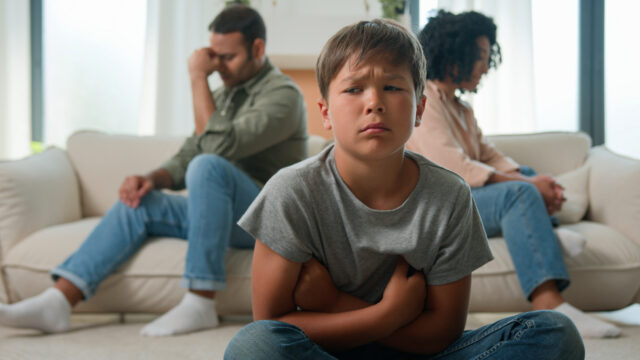If talking about your feelings never felt easy growing up, there’s usually a reason.

For a lot of people, emotional expression wasn’t just discouraged—it was quietly shut down, ignored, or misunderstood. And even if your childhood looked “fine” on the surface, the way emotions were handled in your home can shape how comfortable you feel sharing them now. Here are some common experiences that might explain why opening up didn’t come naturally, and why that still lingers in subtle ways today.
1. You were praised for being the “easy” or “low-maintenance” kid.

If adults constantly complimented how quiet, calm, or undemanding you were, you may have learned early that having big emotions was something to avoid. You probably felt that the less you expressed, the more approval you received. It’s not that you didn’t have feelings; it’s that you learned not to show them. After a while, that trains you to disconnect from your own emotional needs, even if you’re deeply aware of other people’s.
2. Your emotions were only acknowledged when they were positive.

If you were only met with warmth when you were happy, polite, or upbeat, you probably started to believe that sadness, anger, or frustration made you a problem. Negative feelings were something to hide, not process. That conditioning doesn’t disappear. Even now, you might struggle to open up unless you can package your emotions neatly. You’ve been taught that expressing discomfort risks rejection, and that’s a hard belief to unlearn.
3. Adults around you shut down or got uncomfortable when you were upset.

If crying made your parents panic, get annoyed, or walk away, you learned that your pain made people uneasy. Rather than support, you got silence—or worse, shame—for simply having feelings. Growing up in that environment teaches you to self-soothe in silence. Not because it worked, but because it was safer than reaching out. Even now, it might feel easier to keep it all in than risk someone reacting poorly.
4. You were often told to “toughen up” or “stop being dramatic.”

Being met with eye rolls or criticism whenever you were emotional sends a clear message: your feelings are too much. When those phrases show up enough, you learn to shut down before anyone else can shut you down first. This leads to a quiet kind of suppression. You might not even realise how often you downplay your needs or feelings until you try to express them and feel instantly self-conscious or apologetic.
5. You felt responsible for keeping the peace in your home.

If your household was tense, unpredictable, or emotionally messy, you may have stepped into the role of “the steady one.” Expressing your own emotions felt dangerous because it could add to the chaos or get overlooked entirely. Even now, expressing how you feel can bring up guilt, as if you’re being too much or causing conflict. That habit of staying quiet to protect other people doesn’t just vanish once you’re an adult—it lingers until you consciously shift it.
6. You didn’t have adults who modelled healthy emotional expression.

If your caregivers were emotionally unavailable, explosive, or emotionally shut off, you didn’t learn by example how to talk about feelings in a grounded way. You were left to guess, or avoid altogether. As an adult, you might feel awkward naming your emotions or unsure what emotional honesty is supposed to look like. That’s not a flaw; it’s the result of having no roadmap for it growing up.
7. You were given labels that made you feel emotionally defective.
 Source: Unsplash
Source: Unsplash If you were called “overly sensitive,” “too intense,” or “moody,” you probably internalised that there was something wrong with how you felt. Instead of being taught how to manage your emotions, you were made to feel ashamed for having them. Now, you might second-guess every emotional response or apologise before you even finish a sentence. That old shame still whispers that it’s safer to stay silent than risk being judged again.
8. You were expected to “get over it” quickly.

If people didn’t make space for your feelings to last longer than a few minutes, you learned to rush your own emotional process. Lingering sadness or anger was treated as inconvenient, or manipulative. This can create pressure to move on before you’re ready. Even now, you might struggle to sit with discomfort or give yourself permission to feel things fully without guilt.
9. Your feelings were invalidated with logic or comparisons.

If your pain was met with “Other people have it worse” or “That’s not a big deal,” you probably learned to doubt your emotional instincts. Logic always won, and feelings were treated like they needed to be justified to be real. Emotional invalidation makes it hard to trust yourself. You might now struggle to know if your emotions are “reasonable” or not because you were taught to dismiss them before even exploring them.
10. You were only comforted after you “calmed down.”

If care only came after you’d stopped crying or pulled yourself together, you learned that your pain needed to be hidden to receive support. So you started managing your emotions alone, in silence, just to stay connected. Now, even when you’re struggling, you might wait until you’re composed to reach out— not because you want to, but because somewhere along the way, you learned that your messy feelings made connection feel conditional.
11. You had no language for what you were feeling.

Words like “hurt,” “overwhelmed,” or “anxious” might not have even been part of the conversation growing up. If no one modelled emotional vocabulary, you were left with raw sensations and no way to describe or explain them. Even now, you might go quiet not because you don’t feel anything, but because you literally don’t know how to put it into words. That’s not emotional immaturity; it’s a gap in the language you were never taught to speak.
12. You were taught that emotions were a private matter, not to be shared.

If your family believed in keeping things to themselves—“we don’t talk about that,” “what happens in this house stays in this house”—you learned early that opening up was unsafe or inappropriate. These days, expressing feelings might feel like breaking a rule you can’t quite name. Even in safe spaces, there’s a tension that says: “Don’t say too much.” That’s a hard barrier to push through until you recognise where it came from.
13. You were rewarded for suppressing your feelings.

If being stoic, “strong,” or emotionally detached earned you praise, you internalised that emotional control was the goal, and that vulnerability made you weak or unstable. That kind of messaging is hard to shake. It’s not surprising if opening up still feels unfamiliar or exposed. You weren’t taught to see it as a strength—you were taught to see it as a liability. Relearning that openness is safe takes time, but it’s entirely possible.
14. You still feel like expressing feelings will cost you something.

Maybe it’s closeness, respect, or someone’s patience. If your early experiences taught you that emotions lead to conflict, shutdowns, or withdrawal, then staying quiet became your way of staying connected—even when it hurt. Now, even if you’re surrounded by emotionally healthy people, your system might still brace for impact when you open up. That doesn’t mean you’re broken—it means your nervous system hasn’t caught up to your present yet. But it can.




